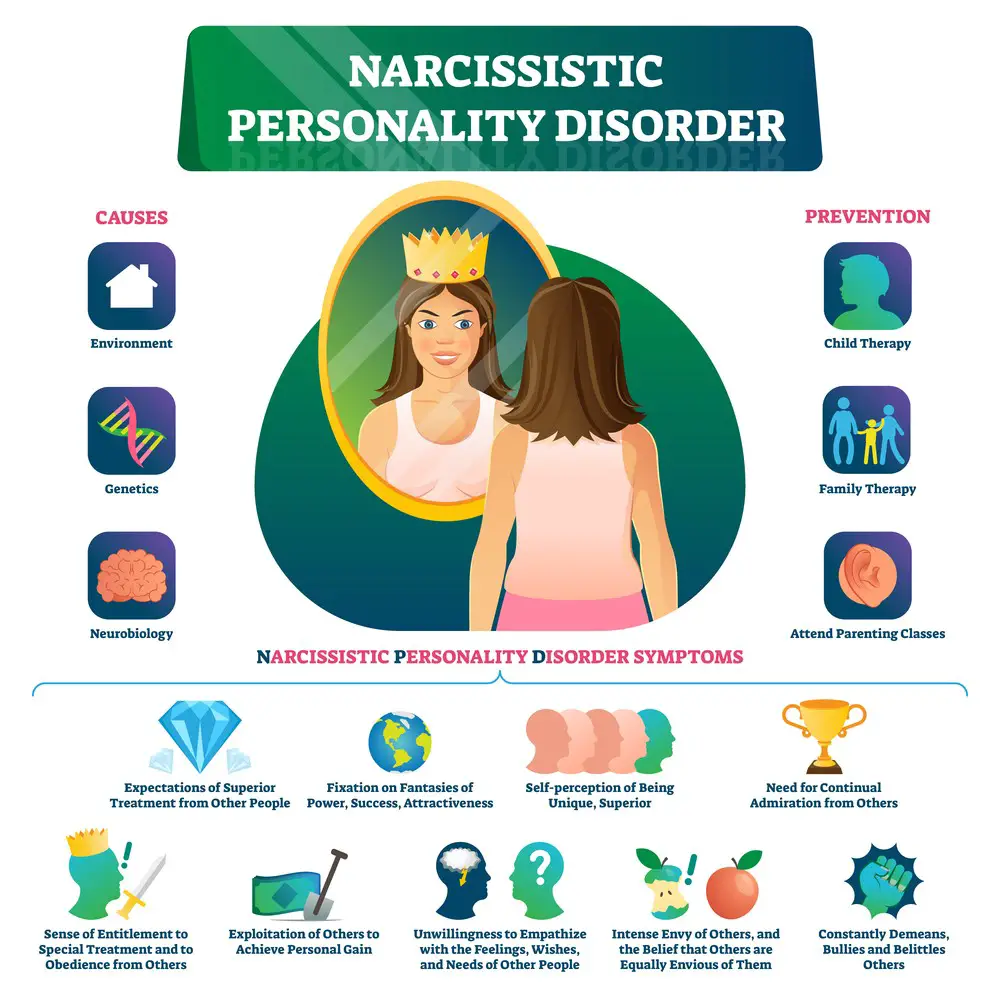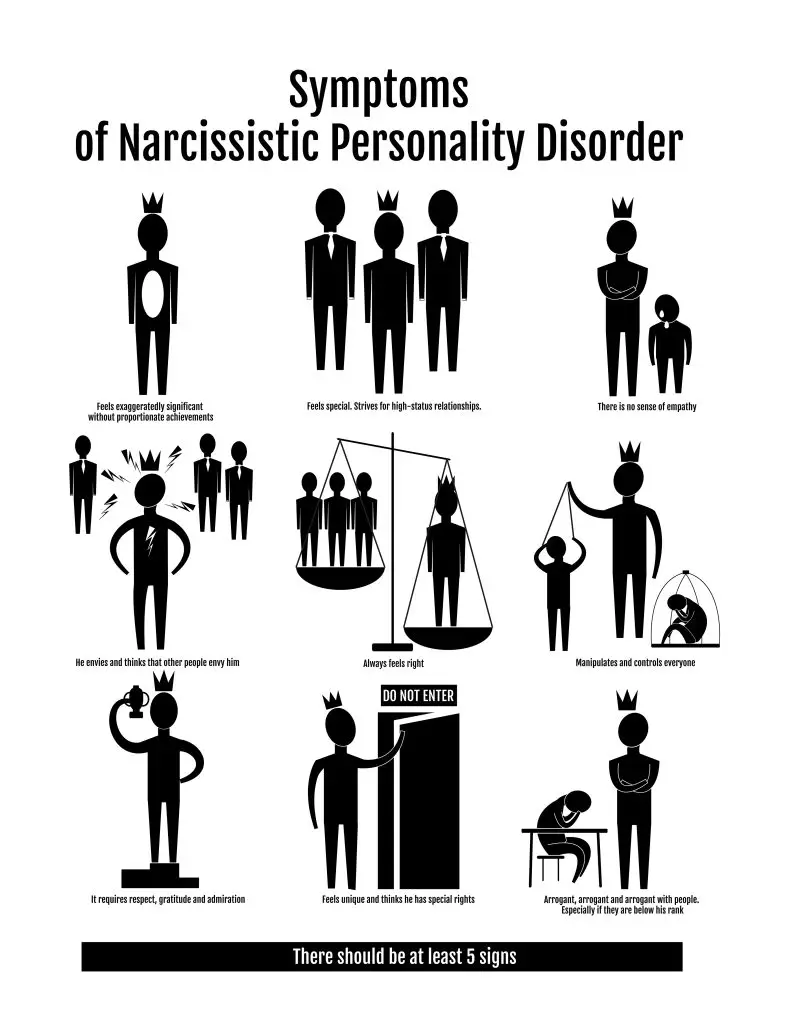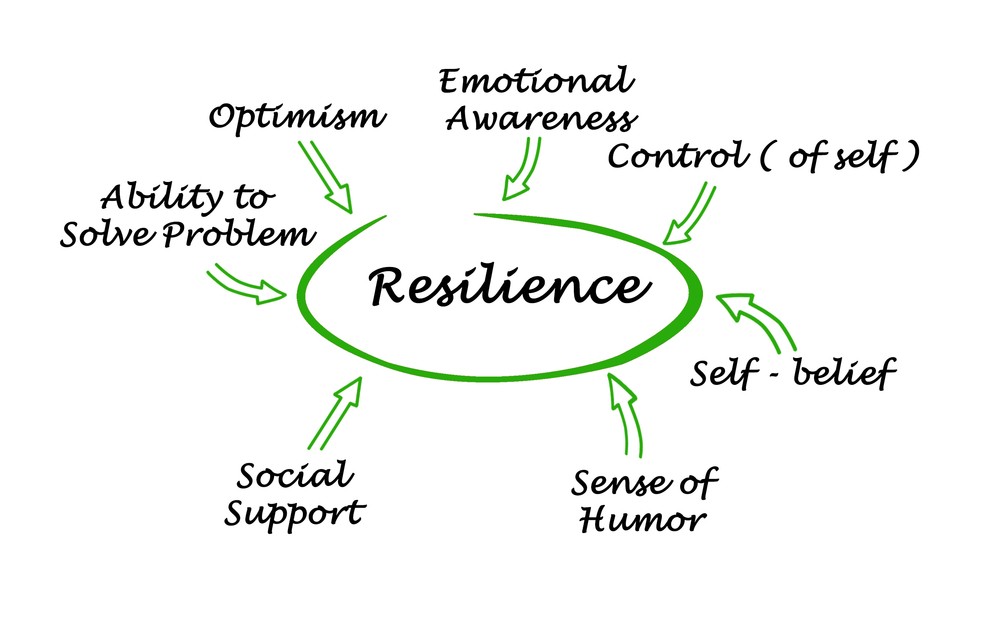As a BetterHelp affiliate, we receive compensation from BetterHelp if you purchase products or services through the links provided
Narcissists, characterized by a heightened sense of self-importance and a need for excessive attention and admiration, tend to enter into relationships that can satisfy these demands. They often look for partners who can feed their ego, offer them status, or present a particular image to the world that aligns with their desire to be seen as superior. It’s not uncommon for partners of narcissists to be compassionate and caring, traits that make them more likely to accept the challenging behavior of their spouse.
When a narcissist decides to marry, their partner may initially be placed on a pedestal, in what is known as the idealization phase. During this time, the spouse might feel highly valued and excessively adored. However, in a narcissist’s marriage, the relationship dynamic can change dramatically over time. The narcissist’s partner may find themselves trying to meet an impossible standard, and the relationship can become a one-sided quest to keep the narcissist happy, often at the expense of their own needs and well-being.
Understanding the dynamics of a marriage with a narcissist is essential, both for those who find themselves in such a relationship and for those witnessing it from the outside. Recognizing the signs and the challenges involved can be the first step to addressing the situation and seeking the right support or intervention.
Key Takeaways
- Narcissists tend to marry those who bolster their ego and provide them with admiration.
- The spouse of a narcissist often undergoes a transition from idealization to facing a one-sided relationship dynamic.
- Recognizing the signs of a narcissist’s marriage can be crucial for seeking support and handling challenges.
 Narcissistic Personality Traits
Narcissistic Personality Traits
When trying to understand the characteristics of narcissistic personality, it’s key to note they often exhibit a persistent pattern of grandiosity, a need for admiration, and a lack of empathy. Here’s a closer look at these traits:
Grandiosity
Narcissists believe they are unique and superior. They may display exaggerated self-importance, often requiring constant praise and admiration.
- Sense of Entitlement: You might notice they have unreasonable expectations of favorable treatment.
- Fantasies of Success: They dream of unlimited power, beauty, or ideal love.
Need for Admiration
A constant need for attention and validation is central to a narcissist’s interactions.
- Fishing for Compliments: They require excessive admiration.
- Sensitive to Criticism: A lack of resilience to even gentle critiques could be telling.
Lack of Empathy
Understanding and recognizing the feelings and needs of others may not come naturally to them.
- Difficulty in Relationships: Their relationships might be superficial and primarily self-serving.
- Using Others: They might take advantage of others to achieve personal goals.
Key Takeaway: Recognizing these traits in someone can guide your interactions with them and help manage your expectations of the relationship.

Attraction Patterns of Narcissists
Narcissists are drawn to partners who enhance their self-image and social standing. They often prioritize certain traits in their prospective spouses.
Physical Attractiveness
Narcissists value physical attractiveness highly, as it directly boosts their image to be seen with a visually appealing partner.
Key Takeaway: You might notice that a narcissist often seeks out partners who are conventionally attractive and well-groomed, as this reflects positively on their image.
Admiration and Adoration
A partner’s willingness to offer admiration and adoration is crucial for narcissists.
- They thrive on being the center of attention and receiving constant praise.
- Narcissists often choose partners who are willing to maintain this dynamic of admiration.
Key Takeaway: If you’re with a narcissist, you’ll find that your ability to shower them with praise might be as important to them as your own qualities.
Societal Status and Connections
Societal status and connections play a significant role in the attraction patterns of narcissists.
- They often seek partners who can provide them with social leverage or enhance their prestige.
- Such partners may have influential careers or come from a well-respected family.
Key Takeaway: Your societal influence or network might be a magnet for a narcissist, as it helps increase their importance in social circles.
 Idealization Phase in Relationships
Idealization Phase in Relationships
During the early stages of a relationship, specifically the idealization phase, a narcissist may shower you with attention and admiration. They often manifest their best behaviors to make you feel special and valued. This period is characterized by:
- Excessive compliments: You’ll likely hear how wonderful you are, which is both flattering and overwhelming.
- Grand gestures: Expect romantic acts that seem straight out of a movie to sweep you off your feet.
- Future promises: They may paint a perfect picture of your future together, cementing their place in your life.
You might notice the following patterns:
- Rapid pace: The relationship may progress quickly, with intense intimacy and commitment.
- Constant communication: Expect a barrage of messages and calls, making you the center of their world.
However, it’s not just about what they do, but how they make you feel:
- You feel like you’re on a pedestal, which can be both exhilarating and disconcerting.
- There’s a sense of soulmate-level connection, often described as “too good to be true.”
The key takeaway from this phase is to enjoy the positive attention but remain aware of the pace and intensity of the relationship. It’s healthy to set boundaries and listen to your intuition. If something feels off, it’s worth taking a step back to assess the situation objectively.
 Dynamics of a Narcissist’s Marriage
Dynamics of a Narcissist’s Marriage
In a marriage with a narcissist, you’ll often encounter power plays, emotional roller coasters, and a brawl for autonomy.
Control and Manipulation
Narcissists have a penchant for controlling their spouses. They may use tactics such as:
- Gaslighting: Making you question your memory or perception.
- Isolation: Limiting your contact with friends and family to increase dependence.
Key Takeaway: Be aware of these manipulation strategies to maintain your sense of reality and relationships with others.
Emotional Volatility
Interacting with a narcissist can be like riding a never-ending emotional carousel. You might experience:
- Unpredictable mood swings ranging from intense affection to cold dismissiveness.
- Outbursts of anger or jealousy without much provocation.
Key Takeaway: Recognizing these patterns can help you respond to emotional swings with a level head.
Dependency and Independence
Narcissists often weave a complex web of dependency in relationships. Here’s what that might look like:
- Alternating between demanding support and championing self-sufficiency to keep you off-balance.
- Making financial or emotional decisions that bind you closer to them and limit your independence.
Key Takeaway: Strive for personal autonomy to guard against becoming tethered to the narcissist’s whims.
Complementary Personalities
Narcissists often gravitate towards partners whose personalities complement their need for dominance and affirmation.
Codependent Partners
- Codependent individuals often place a lower priority on their own needs and exhibit a strong desire to care for others.
- Their willingness to put the narcissist’s desires first can create a one-sided relationship dynamic.
Key takeaway: Codependency might provide the support framework a narcissist looks for in a spouse, where their needs are consistently prioritized.
Empathetic Individuals
- Highly empathetic people possess the ability to understand and share the feelings of others, which can draw them to narcissists’ often complex and intense emotional states.
- They may be moved to soothe the narcissist’s insecurities or validate their self-worth.
Key takeaway: Empaths may be attracted to the perceived depth in a narcissist’s character, providing the emotional attentiveness they crave.
 Submissive Temperaments
Submissive Temperaments
- Individuals with submissive temperaments are less likely to challenge the authority or desires of a partner, which aligns well with the narcissist’s need for a sense of control.
- Their reluctance to confront or oppose may maintain a harmonious façade in the relationship.
Key takeaway: A submissive partner might avoid conflict with a narcissistic spouse, thus reinforcing the narcissist’s position of dominance.
Criteria Narcissists Look for in a Spouse
When you think about the traits a narcissist might seek in a spouse, it’s essential to recognize their need for a relationship that enhances their self-perceived status. They often look for partners who can give them excessive admiration and bolster their egos.
- Compliment-giving: You’ll often find them with someone who showers them with praise.
- Attention-providing: A partner who focuses attention on the narcissist is ideal.
Status-Enhancing Traits:
- Physical attractiveness: They may prioritize a partner with looks that others envy.
- Successful career: Achievements that reflect well on the narcissist are a plus.
- Willingness to put the narcissist’s needs first.
- Avoidance of confrontation regarding the narcissist’s behavior.
- Flexibility to accommodate the narcissist’s changing demands.
- Emotional resilience to endure the narcissist’s self-centeredness.
Narcissists tend to seek partners who make them look and feel superior. They also gravitate towards empathetic and nurturing individuals, as these partners are more likely to tolerate and give in to their need for constant validation.
Key Takeaway: If you’re in a relationship with a narcissist, you’re likely very giving, maybe to the point of self-sacrifice. Your sparkling qualities shine bright, but to a narcissist, they’re often seen as a reflection of their greatness. Stay aware; ensure you’re valued for who you are, not just for what you can give.
 Common Challenges in Marriages to Narcissists
Common Challenges in Marriages to Narcissists
Marrying someone with narcissistic tendencies can invite unique obstacles that require strength and understanding to navigate.
Communication Breakdown
Efficient communication is the cornerstone of any healthy relationship, yet marriages with narcissists often endure a stark breakdown here. You might find that your own thoughts and feelings are sidelined or dismissed entirely. Diving into deeper discussions or conflicts can be daunting, as it often leads to:
- Frequent misunderstandings
- The frustration of not being heard
- An overwhelming sense of isolation
Remember, it’s not your responsibility to shoulder the entire communication load; a partnership necessitates effort from both sides.
 Lack of Emotional Intimacy
Lack of Emotional Intimacy
Emotional connection forms another vital element in marriage, but narcissists may struggle to provide this. You may observe a significant:
- Absence of empathy towards your emotions
- Difficulty in achieving mutual support and understanding
Creating a bond that flourishes emotionally is tough when your feelings are not reciprocated as needed.
Parenting Conflicts
Parenting with a narcissistic partner can be particularly tricky. Contrasting views on upbringing often emerge and flare up into disputes. It’s common to encounter:
- Disagreements on parenting styles
- Confusion in children due to inconsistent rules
- A challenging environment to foster healthy development
Finding common ground is essential here. It’s vital to set clear boundaries and rules that are in the best interest of your children’s welfare.
Surviving a Marriage with a Narcissist
Getting through a marriage with a narcissist can be incredibly challenging. It requires consistent effort in setting boundaries, seeking the right support, and focusing on your personal development.
 Setting Boundaries
Setting Boundaries
It is essential to establish clear boundaries with your narcissistic partner. This sets the stage for mutual respect and clearly defines what behavior you will and will not tolerate.
- Identify your limits: Know what you can handle and what is too much.
- Communicate clearly: Be straight to the point when discussing your boundaries.
- Enforce consequences: If boundaries are crossed, follow through with the agreed-upon repercussions.
Key Takeaway: Enforcing boundaries is crucial for your mental well-being.
Seeking Support
Walking this road solo can be overwhelming, but reaching out for support can make a difference.
- Connect with close friends: Share your experiences with trusted individuals.
- Professional guidance: Therapists or support groups specializing in narcissism can offer tailored advice.
- Legal counsel: Consulting with a legal professional can sometimes help protect your rights.
Key Takeaway: A strong support network is vital in navigating the complex dynamics of a narcissistic marriage.
Personal Development
Investing in yourself is critical when married to a narcissist. Staying strong and centered helps you maintain perspective.
- Cultivate self-care: Prioritize activities that nurture your health and happiness.
- Set personal goals: Focus on your growth, whether career, education, or hobbies.
- Practice self-compassion: Treat yourself kindly and recognize your worth.
Key Takeaway: Personal growth leads to empowerment and resilience in difficult circumstances.
Narcissism and Divorce
Divorce can be challenging, but it gets particularly tricky when one partner exhibits narcissistic traits. You might find yourself faced with a spouse who’s uncooperative and manipulative, making the legal and emotional process of divorce even more challenging.
Common Challenges:
- Inflated Ego: Your partner may refuse to admit fault or engage in constructive conversation.
- Control: They might try to maintain dominance by manipulating the divorce proceedings.
- Lack of Empathy: A narcissist may not recognize or care about your emotional needs.
- Conflict: There can be a higher tendency for confrontations, which may draw out the divorce process.
What You Can Do:
- Set Boundaries: Firmly establish what you will and won’t tolerate.
- Document Everything: Keep records of your interactions to protect yourself from gaslighting or false accusations.
- Self-Care: Prioritize your emotional well-being; divorce is stressful, and you must look after yourself.
- Legal Counsel: Consider hiring a lawyer experienced in handling high-conflict divorces.
While dealing with divorce, it’s essential to stay grounded. Remember your needs and rights, and don’t hesitate to ask for help from friends, family, or professionals. A support system is vital during this time.
Key Takeaway: If your spouse has narcissistic tendencies, be prepared for a challenging divorce process. Protect yourself by establishing clear boundaries and seeking the right assistance. Remember that you’re not alone, and there are strategies to manage the situation effectively.
 Healing and Recovery Post-Divorce
Healing and Recovery Post-Divorce
After a divorce with a narcissistic partner, your journey towards healing and recovery takes center stage. Take these steps to foster your well-being:
- Self-compassion: Be kind to yourself as you process the complex emotions.
- Supportive network: Lean on friends, family, or support groups who understand.
- Professional help: Consider therapy to work through feelings of self-doubt or worthlessness.
- Healthy routines: Establish new patterns in your daily life to encourage stability.
- Reflect on your experiences:
- Identify harmful patterns.
- Acknowledge your resilience.
- Set personal goals:
- Focus on hobbies or interests you set aside.
- Aim for small, manageable achievements.
Remember, you have the strength to rebuild your life post-divorce. Take one day at a time and celebrate the small victories on your path to recovery.
Key Takeaway: Rebuilding your life after divorcing a narcissist is a process that requires self-care, support, and patience. Surround yourself with positivity as you work towards a fulfilling future.
Frequently Asked Questions
Navigating a relationship with a narcissist can be challenging, and understanding the dynamics of whom they marry is crucial.
Can a narcissist maintain a successful marriage?
Narcissism can strain relationships, marked by a need for admiration and a lack of empathy. However, some narcissists may maintain a marriage by finding a partner who bolsters their self-esteem and tolerates their behavior.
Key takeaway: Success in a narcissist’s marriage often hinges on the partner’s response to their behavior.
What are the typical traits of a spouse chosen by a narcissist?
Narcissists often seek out partners who are empathetic, nurturing, and status-enhancing. They prefer individuals who admire them and are willing to put the narcissist’s needs first.
Key takeaway: The spouse’s traits often reflect the narcissist’s desires for admiration and affirmation.
Do narcissists tend to marry for financial reasons?
While some narcissists may marry for love, others could prioritize financial stability. They might seek partners who enhance their image or lifestyle, viewing the relationship as a means to an end.
Key takeaway: Material benefits can be a motivating factor for a narcissist seeking marriage.
Is the way a narcissist treats all partners uniformly?
No, a narcissist’s treatment of partners can vary. Some may experience intense courtship and idealization, while others could face devaluation quickly. It often depends on the narcissist’s personality and their partner’s attributes.
Key takeaway: Your experience with a narcissist may differ from others based on individual dynamics.
What is the likelihood of a narcissist staying in a long-term marriage?
Long-term marriages involving a narcissist can happen, but they often face challenges due to the narcissist’s difficulty with empathy and tendency toward self-centered behavior.
Key takeaway: The probability of enduring a long-term marriage with a narcissist is contingent on complex interpersonal factors.
How does a narcissist’s behavior affect their spouse in a marriage?
Living with a narcissist can leave spouses feeling undervalued and questioning their reality. The narcissist’s demand for attention and their manipulative tactics can be highly stressful and emotionally draining.
Key takeaway: A spouse may endure significant emotional impact due to a narcissist’s conduct.
- 7 Ideas to Help You Relax and Unwind on a Family Vacation - April 27, 2025
- How Having Cybersecurity Protection Helps You Relax - April 25, 2025
- 8 Reasons Why Spending Time Outside Calms You Down - April 25, 2025
This site contains affiliate links to products. We will receive a commission for purchases made through these links.


 Narcissistic Personality Traits
Narcissistic Personality Traits Idealization Phase in Relationships
Idealization Phase in Relationships Dynamics of a Narcissist’s Marriage
Dynamics of a Narcissist’s Marriage Submissive Temperaments
Submissive Temperaments Common Challenges in Marriages to Narcissists
Common Challenges in Marriages to Narcissists Lack of Emotional Intimacy
Lack of Emotional Intimacy Setting Boundaries
Setting Boundaries Healing and Recovery Post-Divorce
Healing and Recovery Post-Divorce Meet Jacob Maslow: Navigating Life with Resilience and Insight
Meet Jacob Maslow: Navigating Life with Resilience and Insight

